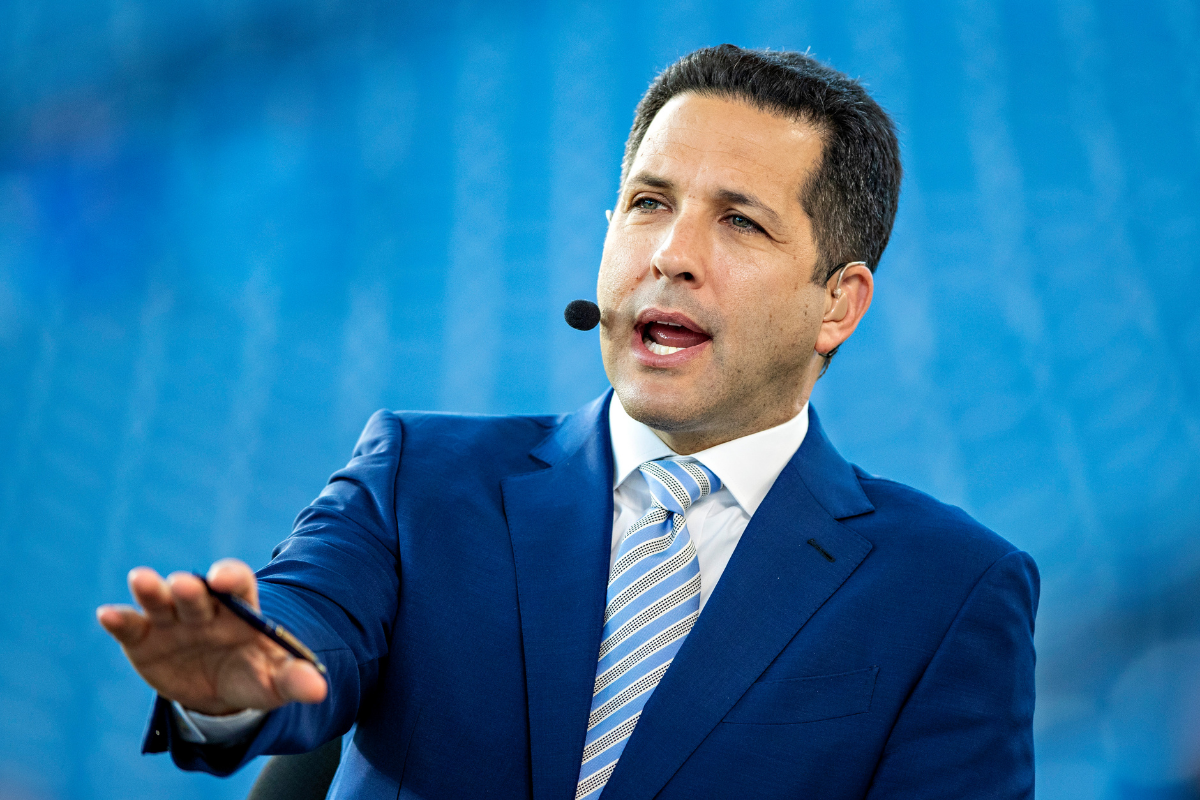Adam Schefter is a household name in the NFL world. At 58 years old, with over two decades of experience in sports journalism, Schefter has solidified himself as the go-to insider for breaking NFL news. His resume speaks for itself: he’s a staple on ESPN, a reliable source for the biggest scoops, and one of the most connected reporters in the league. With an estimated net worth of $4 million and a stable family life alongside his wife Sharri Maio and their children, Schefter is living the dream. But even the best in the business can occasionally misstep, as he demonstrated with a tweet that sent NFL Twitter into an uproar this weekend.
The Tweet That Ruffled Feathers
On Saturday evening, Schefter took to Twitter to share news about a potential NFL rule change. “For all those complaining that Patrick Mahomes gets too many calls, relief soon could be on the way,” he wrote, alongside a link to an article explaining the league’s plans to expand replay assist to plays like quarterback slides. At first glance, it may have seemed like a standard Schefter tweet — breaking news with a touch of context to grab attention. But the way he framed it, singling out Mahomes, sparked widespread backlash from fans, players, and even fellow media personalities.
The backlash wasn’t about the rule change itself but about how Schefter seemingly targeted one of the NFL’s biggest stars. Patrick Mahomes, the 29-year-old Kansas City Chiefs quarterback with two Super Bowl wins and a league MVP to his name, has often been scrutinized for supposedly getting favorable calls from referees. Schefter’s tweet appeared to lean into this narrative, and many people took issue with it.
A League-Wide Issue, Not a Mahomes Issue
FS1’s Nick Wright, never one to shy away from sharing his opinions, was quick to call out Schefter. “Listen, I (and basically everyone) like @AdamSchefter,” Wright began, “but writing this piece, framing it around Mahomes exclusively, and not including the fact that the league says both calls were correct & replay wouldn’t have changed either is simply ludicrous & poor journalism.”
Wright’s frustration was echoed by others, who felt that Schefter’s framing unfairly turned the focus onto Mahomes instead of addressing the broader issue of officiating consistency in the NFL. Mitchell Schwartz, a former Chiefs offensive lineman, took things a step further by pointing out the potential damage such narratives can cause. “The league’s voice with the largest reach is insinuating the league both influences games via refereeing AND favors one team specifically,” he wrote. “It’s not a cute little joke. That would be the biggest sports scandal ever, especially with everything being tied to gambling these days.”
And they have a point. The NFL is more scrutinized than ever, especially with legalized sports betting becoming a massive industry. For someone with Schefter’s platform to inadvertently feed into conspiracy theories about biased officiating could have significant consequences.
Fans Join the Fray
Fans, as expected, didn’t hold back. Twitter exploded with comments like, “Seriously, why frame this potential rule change to push a ridiculous conspiracy theory? I thought you had more integrity,” and, “Hahahaahha still can’t believe he framed his tweet like this. What a clown.” Another fan summed up the general sentiment, saying, “The most prominent NFL insider is attempting to turn the face of the league into a villain over a [expletive] narrative that’s taken on a life of its own … this is nasty work.”
It’s worth noting that Mahomes has faced plenty of criticism over his career, much of it undeserved. As one of the most marketable players in the league, he’s become a lightning rod for both praise and criticism. But to suggest — even unintentionally — that the league is actively favoring him? That’s a dangerous narrative to propagate, especially without solid evidence.
Schefter’s Impact and Responsibility
Schefter has built a career on being the first to break news, but that comes with immense responsibility. With over 10 million Twitter followers and a reputation as the most credible source for NFL updates, his words carry significant weight. A poorly worded tweet or an offhand remark can spiral into a full-blown controversy, as we’ve just seen.
This isn’t the first time Schefter’s tweets have stirred the pot. In 2022, he faced criticism for the way he reported on Dwayne Haskins’ tragic death, focusing on the quarterback’s struggles in the NFL rather than the loss of a young life. While Schefter later apologized, it served as a reminder that even seasoned professionals can make mistakes when trying to balance speed and sensitivity.
A Lesson for Journalists Everywhere
Schefter’s tweet about Mahomes and the potential rule change is a prime example of how framing matters in journalism. The actual story — that the NFL is considering expanding replay assist to include plays like quarterback slides — is significant. It’s a response to ongoing debates about officiating consistency and how technology can improve the game. But by tying the story to Mahomes, Schefter inadvertently overshadowed the broader implications of the rule change.
This incident is also a cautionary tale for journalists in the social media age. With the pressure to deliver breaking news and generate engagement, it’s easy to fall into the trap of sensationalism. But as Schefter’s tweet shows, a poorly framed headline or tweet can undermine credibility and distract from the real issue at hand.






